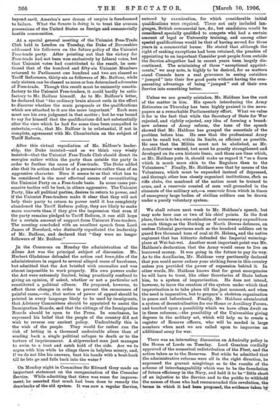After this virtual repudiation of Mr. Ba . lfour's leader- ship, the
Duke insisted—and as we think very wisely insisted—that the Unionist Free-Trade Club should direct its energies rather within the party than qutside the party in order to further the cause of Free-trade. The Duke added also that its action should be of a persuasive rather than of an aggressive character. Here it seems to us that what has to be considered is the most effectual means of reconstituting the Unionist Party on a Free-trade basis. In some cases per- suasive tactics will be best, in others aggressive. The Unionist Party, like all political parties, desires to return to power, and if the Unionist Free-traders make it clear that they will not help their party to return to power until it has completely abandoned the Tariff Reform policy, they are likely to make more converts than if they give the impression that even if the party remains pledged to Tariff Reform, it can still hope for a certain Amount of support from Unionist Free-traders. The meeting concluded with an excellent speech from Lord James of Hereford, who distinctly repudiated the leadership of Mr. Balfour, and declared that "they were no longer followers of Mr. Balfour."










































 Previous page
Previous page